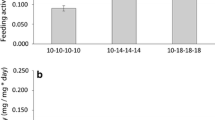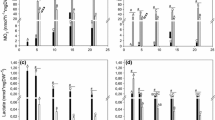Summary
Acclimation of the earthworm,Lampito mauritii, to low temperature (19° C.) results in increased activity of the neurosecretory cells in the brain. Addition of body fluids of cold-acclimated worms to the perfusion fluid causes increased (25%) oxygen consumption of normal worm (29° C.) tissues as well as warm (35° C.) acclimated worm tissues.
The results are discussed and it is suggested that the physiological changes resulting in acclimation to low temperature are triggered by the neurosecretory release of one or more humoral agents which cause systemic changes and induce increased synthesis of enzyme proteins and perhaps also directly act on tissues to raise their metabolic level. Attention is drawn to the similarity of the sequence of events occurring in connection with moulting in insects.
Similar content being viewed by others

References
Knox, W. E... “Adaptive enzymes in the regulation of animal metabolism,” inPhysiological Adaptation, The Ronald Press Company, New York, 1958.
Precht, H. J., Christophersen, J. and Hensel, H.Temperatur und Leben, Springer Verlag, Berlin, 1955.
Author information
Authors and Affiliations
Additional information
Communicated by Dr. H. Srinivasa Rao,f.a.sc.
Rights and permissions
About this article
Cite this article
Rao, K.P., Saroja, K. Physiology of low temperature acclimation in tropical poikilotherms. Proc. Indian Acad. Sci. 58, 14–18 (1963). https://doi.org/10.1007/BF03052067
Received:
Issue Date:
DOI: https://doi.org/10.1007/BF03052067



